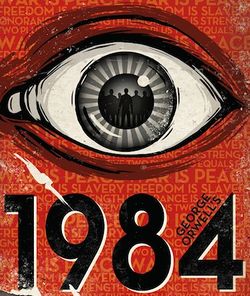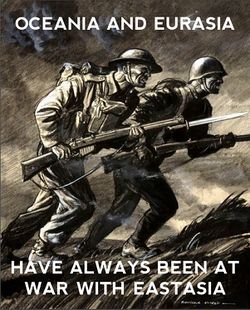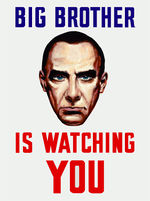Difference between revisions of "Nineteen Eighty-Four"
(|constitutes=) |
m (Text replacement - " -- " to " — ") |
||
| (5 intermediate revisions by 4 users not shown) | |||
| Line 6: | Line 6: | ||
|type=fiction | |type=fiction | ||
|subjects=new world order, totalitarianism, newspeak, doublespeak, | |subjects=new world order, totalitarianism, newspeak, doublespeak, | ||
| − | |constitutes=dystopia, book | + | |constitutes=dystopia, book, sci-fi |
|amazon=https://www.amazon.com/1984-Signet-Classics-George-Orwell/dp/0451524934/ | |amazon=https://www.amazon.com/1984-Signet-Classics-George-Orwell/dp/0451524934/ | ||
|description=A critically acclaimed and some have said all too prophetic warning about totalitarian government. | |description=A critically acclaimed and some have said all too prophetic warning about totalitarian government. | ||
|wikiquote=http://en.wikiquote.org/wiki/Nineteen_Eighty-Four | |wikiquote=http://en.wikiquote.org/wiki/Nineteen_Eighty-Four | ||
| − | }} | + | }}''Not to be confused with the eponymous year in which it was set, [[1984]]'' |
| − | '''Nineteen Eighty-Four''' is a [[dystopia]] about a [[totalitarian]] future of [[perpetual war]] managed by a tiny elite. | + | |
| + | '''''Nineteen Eighty-Four''''' is a [[dystopia|dystopian novel]] about a [[totalitarian]] future of [[perpetual war]] managed by a tiny [[Deep politician|elite]]. | ||
==Topics== | ==Topics== | ||
| − | Orwell coins many new words in the novel, which he describes as '[[Newspeak]]'. | + | Published amid a mood of post war optimism, the novel describes a futuristic [[techno]]-[[totalitarian]] system of governance, in which three superpowers are engaged in perpetual war. It is futuristic, but is not primarily a science fiction novel — the emphasis is more psycho-social than technological, exploring for example patterns of [[social control]] and the psychology of [[dissidence]]. |
| + | |||
| + | ===Language=== | ||
| + | {{FA|Orwellian Language}} | ||
| + | Orwell coins many new words in the novel, which he describes as '[[Newspeak]]'. His focus on deceptive language, particularly in this book, has lead to the word "[[Orwellian]]" being used to describe semantically inverted language - i.e. language which actually means the opposite of what it appears to mean. | ||
===Perpetual War=== | ===Perpetual War=== | ||
| Line 31: | Line 36: | ||
Party members' lives are more disciplined, so for example they are expected to attend the daily "2 minutes of hate" session during which they focus on [[enemy images]]. | Party members' lives are more disciplined, so for example they are expected to attend the daily "2 minutes of hate" session during which they focus on [[enemy images]]. | ||
| − | == | + | == Legacy == |
[[image:COVID-19-84.jpg|right|400px]] | [[image:COVID-19-84.jpg|right|400px]] | ||
| − | + | Orwell's ''Nineteen Eighty-Four'' has given a rich lexicon of images, words and ideas to assist in discourse about [[totalitarianism]]. Some modern discourse is replete with references to the book, which coined many phrases and explored concepts of use when grappling with a totalitarian superstate. The disease [[COVID-19]] was quickly re-labelled "COVID-1984" as a shorthand way of describing its possible uses and/or sinister origins. | |
| + | |||
| + | [[image:boot stamping on a human face.jpg|left|300px|thumbnail|A reference to ''Nineteen Eighty-Four'' about [[COVID-19]] laws]] | ||
| + | |||
| + | ==In popular culture== | ||
| + | In the storyline of the [[2018]] [[Hollywood]] remake of [[Fahrenheit 451]],<ref>https://www.imdb.com/title/tt0360556/</ref> the Ministry (in the sense of the ''Ministry of Truth'' in 1984) that dictates most facets of life, is the successor to the [[Big tech]] companies of our time.<ref>"During the second civil war, the old tech companies developed systems to predict our thoughts. Then they became the ministry, or the Ministry joined them."</ref> | ||
{{SMWDocs}} | {{SMWDocs}} | ||
Latest revision as of 17:43, 1 February 2022
(dystopia, book, sci-fi) | |
|---|---|
 | |
| Type | fiction |
| Publication date | 1949 |
| Author(s) | George Orwell |
| Subjects | new world order, totalitarianism, newspeak, doublespeak |
| A critically acclaimed and some have said all too prophetic warning about totalitarian government. | |
Not to be confused with the eponymous year in which it was set, 1984
Nineteen Eighty-Four is a dystopian novel about a totalitarian future of perpetual war managed by a tiny elite.
Contents
Topics
Published amid a mood of post war optimism, the novel describes a futuristic techno-totalitarian system of governance, in which three superpowers are engaged in perpetual war. It is futuristic, but is not primarily a science fiction novel — the emphasis is more psycho-social than technological, exploring for example patterns of social control and the psychology of dissidence.
Language
- Full article: Orwellian Language
- Full article: Orwellian Language
Orwell coins many new words in the novel, which he describes as 'Newspeak'. His focus on deceptive language, particularly in this book, has lead to the word "Orwellian" being used to describe semantically inverted language - i.e. language which actually means the opposite of what it appears to mean.
Perpetual War
- Full article: Perpetual War
- Full article: Perpetual War
The nation states are engaged in permanent war with each other.
Universal surveillance
- Full article: Universal surveillance
- Full article: Universal surveillance
Orwell predicts the 21st century Mass surveillance by populating the world of Nineteen Eighty-Four with hidden monitoring equipment such as television cameras.
"Steve Jobs included a clip of the movie when Apple launched the Mac, in 1983. 1984 and the internet age coincide and determine the possibility of life imitating art."[1]
Elite rule
Anticipating the Supranational Deep State, the novel depicts a large majority of uninformed and materially deprived citizens ("the proles") who are routinely deceived and swindled by a small minority of party members.
Party members' lives are more disciplined, so for example they are expected to attend the daily "2 minutes of hate" session during which they focus on enemy images.
Legacy
Orwell's Nineteen Eighty-Four has given a rich lexicon of images, words and ideas to assist in discourse about totalitarianism. Some modern discourse is replete with references to the book, which coined many phrases and explored concepts of use when grappling with a totalitarian superstate. The disease COVID-19 was quickly re-labelled "COVID-1984" as a shorthand way of describing its possible uses and/or sinister origins.

In popular culture
In the storyline of the 2018 Hollywood remake of Fahrenheit 451,[2] the Ministry (in the sense of the Ministry of Truth in 1984) that dictates most facets of life, is the successor to the Big tech companies of our time.[3]
References
- ↑ https://melbournepress.com/2017/05/08/georgia-orwells-warning/
- ↑ https://www.imdb.com/title/tt0360556/
- ↑ "During the second civil war, the old tech companies developed systems to predict our thoughts. Then they became the ministry, or the Ministry joined them."


